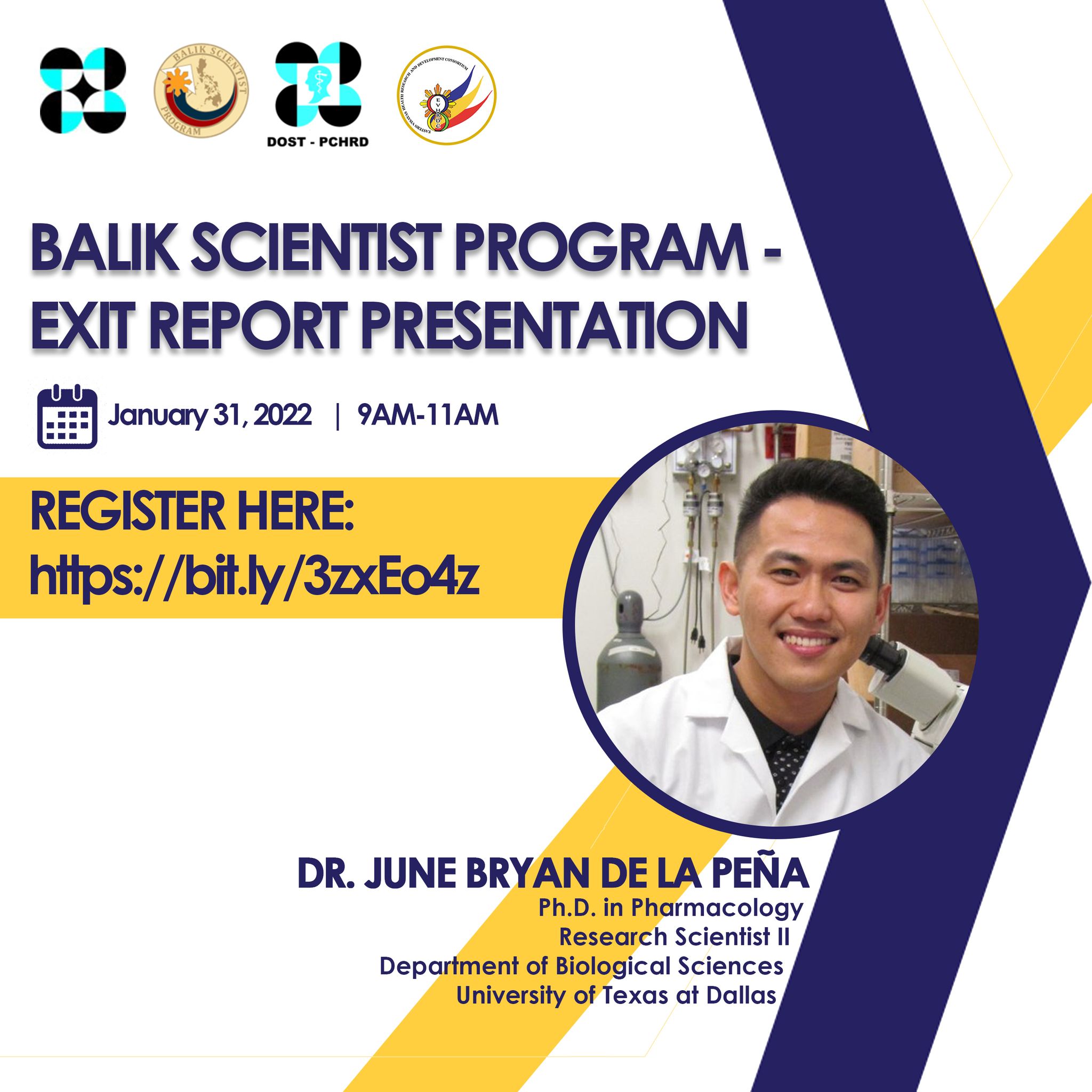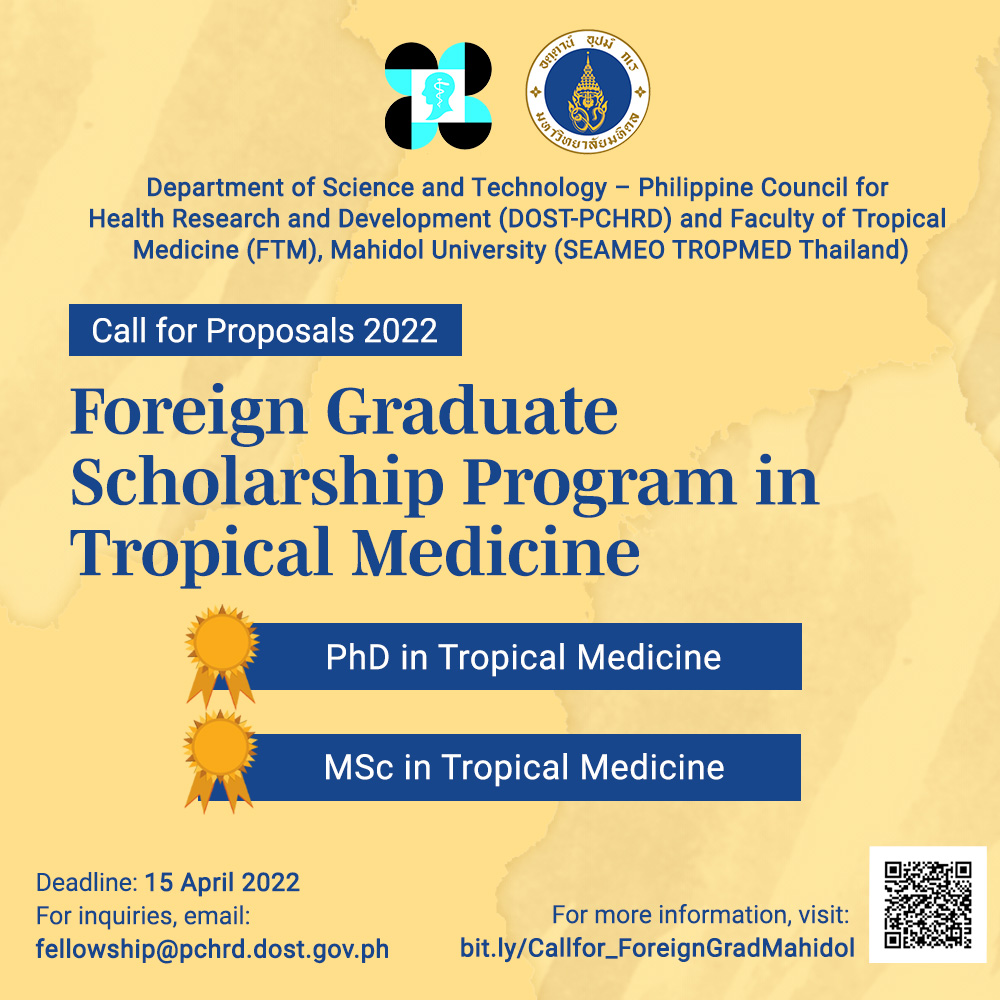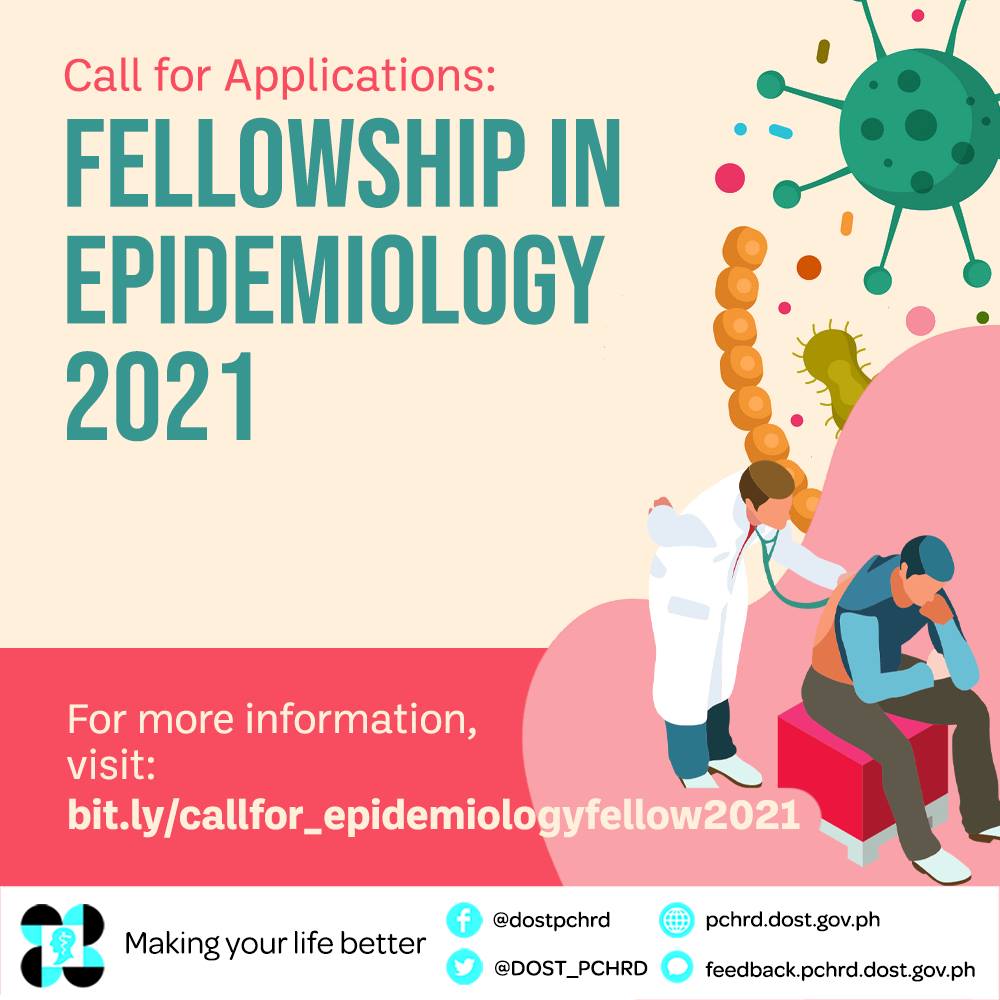Featured Videos
Announcement
- Details
- Written by PCHRD
- Category: Announcement
- Hits: 1198
Overview
The mission of Department of Science and Technology – Philippine Council for Health Research and Development (DOST-PCHRD) and Faculty of Tropical Medicine (FTM), Mahidol University (SEAMEO TROPMED Thailand) is to address health systems needs by developing and strengthening capacity for health research through teaching and research for advanced knowledge in medical sciences and medical services. Hence, both institutions agreed to collaborate on the development and implementation of a graduate scholarship program.
The Foreign Graduate Scholarship Program offers exciting opportunities for research training particularly on tropical diseases. The program aims to provide opportunities to deserving students to study and obtain graduate degrees abroad and develop a pool of high-quality human resources who will contribute to the country’s global competitiveness and economic development.
Programs
Doctor of Philosophy in Tropical Medicine
The three-year multidisciplinary program offers broad areas in Tropical Medicine including Protozoology, Helminthology, Medical Entomology, Microbiology and Immunology, Social and Environmental Medicine, Tropical Hygiene, Tropical Nutrition and Food Science, Tropical Pathology and Molecular Tropical Medicine and Genetics focusing on active learning experience in well-equipped laboratory and at field site to equip graduates with multidisciplinary knowledge and skills in Tropical Medicine.
Master of Science in Tropical Medicine
The two-year program focuses on equipping students with scientific knowledge on tropical diseases, public health and related subjects. The goal of the program is to provide a balanced education that combines knowledge, skills, and moral values. The program has been developed to stimulate students to embrace life-long learning in scientific research, develop their soft and communication skills, and build their leadership ability.
Capacity
One position for PhD program and two positions for MSc program will be available each year at FTM Mahidol University - SEAMEO TROPMED Thailand (Subject to the availability of funds)
Eligibility
The applicant must:
- Be a Filipino citizen;
- Be in good health condition;
- Not be more than 50 years old at the time of application;
- Have completed B.Sc./M.Sc degree in related field of study;
- Have an outstanding academic record;
- Passed the admission requirements for the MSc/PhD study;
- Passed the interview and other screening procedures;
- Have research interests which are aligned with the National Unified Health Research Agenda (NUHRA) and Harmonized National Research and Development Agenda;
- Conduct his/her research for the entire duration of the scholarship and of the MSc/PhD Program; and
- Be willing to render the required service obligation for a period equivalent to twice the length of time or a fraction thereof that they enjoyed the MS/PhD scholarships.
- Details
- Written by Administrator
- Category: Announcement
- Hits: 1023
Join us as we present the accomplishments of Dr. June Bryan de la Peña's short-term Balik Scientist engagement on January 31, 2022, 9:00 AM -11:00 AM via Zoom.
He will also be providing his recommendations to his host institution, the Eastern Visayas Health Research and Development Consortium (EVHRDC), and discuss his plans after his current engagement.
Please register in advance by clicking this link: https://bit.ly/3zxEo4z

- Details
- Written by Administrator
- Category: Announcement
- Hits: 1147
- Develop the knowledge and skills of young researchers in quantitative methods in public health research;
- Conduct intensive training in Epidemiology for fellows; and
- Develop a pool of experts with the appropriate knowledge and skills to conduct quantitative public health research.
- Details
- Written by Administrator
- Category: Announcement
- Hits: 1642
CALLING INDIVIDUAL OR TEAM ANIMATORS!
EVHRDC is holding the first ever Best AVP Award in order to develop and exhibit EVHRDC's project proposal review and evaluation process into an AVP Animation. This AVP will be used to motivate researchers from the region to submit their health research proposals for the consortium’s funding.
GUIDELINES AND MECHANICS
- All Filipino amateur, and professional animators, as well as students (18 years old and above) all over the region are enjoined to participate.
- The storyline of the video should be about the EVHRDC Project Proposal Review Process. Please see details below:
| EVHRDC REVIEW PROCESS |
|
- Strictly one entry per person only (only one person shall represent a group’s entry (an entry is a collaboration of a group).
- FORMAT & Content
- Video must be six (6) to ten (10) minutes in length.
- Video must be submitted in high definition or full definition MP4 format
- All designs will become the property of the EVHRDC, and EVHRDC is solely authorized to use the same for its future promotional activities; however, the creator shall be recognized by the consortium.
- EVHRDC reserves the right to request the creator to make minor revisions on the video, whenever necessary.
- By joining the competition, the participant warrants that the entry is originally made and does not violate any intellectual property rights and has never been used or submitted in any other contests or events, whatsoever.
- You may send your entries to This email address is being protected from spambots. You need JavaScript enabled to view it. on or before November 17, 2021. Please accomplish the contest registration form through the link: https://bit.ly/3k0pdu8
CRITERIA FOR JUDGING
|
Creativity of the Video |
50% |
|
Content Quality (relevance to the topic, storyline) |
30% |
|
Overall quality of the Video (sound, animation) |
20% |
|
TOTAL |
100% |
PRIZES:
1st Place - P 10, 000.00
2nd Place - P 7, 000.00
3rd Place - P 5, 000.00
DEADLINE OF SUBMISSION OF ENTRIES: November 17, 2021
- Details
- Written by Administrator
- Category: Announcement
- Hits: 1388
The 2020 Joint Research Project Call for Proposals between DOST and the Ministry of Science and Technology (MOST) of the People’s Republic of China is now open!
In pursuit of cooperation between the Department of Science and Technology (DOST) and the Ministry of Science and Technology (MOST) of the People’s Republic of China, we are calling for mutually beneficial and collaborative project proposals in any of the following identified priority areas:
- Health
- Agriculture
- Renewable Energy
A total of eight (08) new projects will be approved during this call for proposals. DOST will provide an annual funding of up to Php 8,000,000.00 for each approved research project, while MOST will provide an annual funding of up to RMB 1,000,000.00 for the Chinese counterpart. Each project should have a maximum duration of two (2) years.
For reference, below is the timeline for the 2020 DOST-MOST JRP Call for Proposals:
|
TIMELINE |
|
|
Deadline for submitting applications: |
26 June 2020 |
|
Exchange lists of applications that meet the eligibility requirements: |
By the end of June 2020 |
|
Exchange of respective review results: |
By the end of September 2020 |
|
Selection decision and announcement: |
By the end of October 2020 |
|
Start of project: |
From January 2021 to December 2022 |
|
Submission of final reports: |
Upon completion of each project |
Interested parties are advised to coordinate with prospective counterpart/collaborator in China to craft the project proposals. The Filipino researcher must submit the capsule proposal to DOST through the Office of the Assistant Secretary for International Cooperation while the Chinese counterpart will submit the same to MOST for separate review and evaluation. Only proposals that are endorsed for further submission of full-blown proposals will undergo technical review and possible approval by both DOST and MOST.
The necessary DOST-GIA forms may be downloaded at http://tiny.cc/DOSTGIAForms











